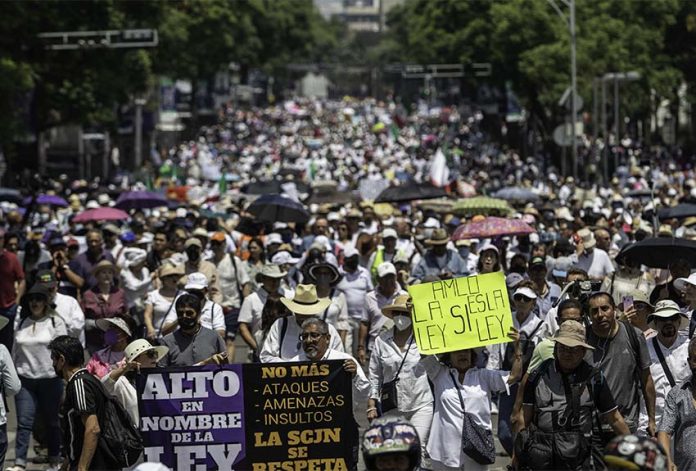Thousands of people took to the streets of cities across Mexico on Sunday to demonstrate their support for the Supreme Court (SCJN) as it comes under repeated verbal attack by President López Obrador.
Some 2,000 people marched from the Monument to the Revolution to Mexico City’s central square, the Zócalo. Some demonstrators clashed with anti-court activists outside the Supreme Court headquarters, located just off the Zócalo.
Así el tamaño de la marcha en defensa de la @SCJN pic.twitter.com/4tIqVglSN1
— Víctor Cabrera (@victorcabreramx) May 29, 2023
Mexico City protesters march toward the Zócalo in defense of the Supreme Court.
Among the other cities where pro-SCJN marches and/or demonstrations were held were Guadalajara, Monterrey, Querétaro, Morelia, Cancún, Xalapa, Oaxaca, Chihuahua and León.
“The law is the law, hands off the court,” shouted march participants in Mexico City, most of whom were dressed in white.
The demonstrations in the capital and elsewhere were a forceful denunciation of López Obrador’s frequent criticism of the SCJN, which has recently handed down rulings against the transfer of control over the National Guard from the civilian Security Ministry to the Defense Ministry, part of his electoral reform package and a 2021 presidential decree that protected government infrastructure projects from legal challenges and scrutiny.
López Obrador, who has been an outspoken critic of the judiciary since early in his presidency, has responded to the rulings by calling the Supreme Court “rotten” and asserting that it is at the service of criminals and the country’s powerful elite rather than “the people.”
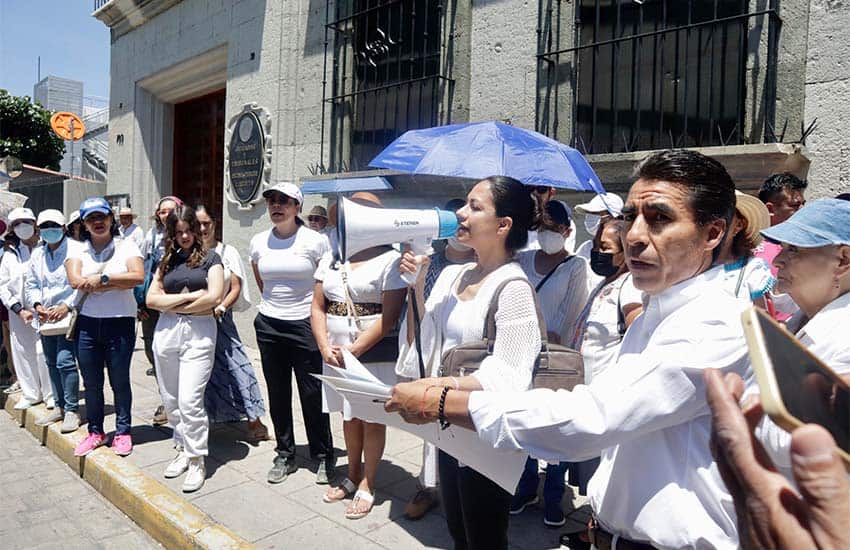
He also issued a new decree to shield certain infrastructure projects, including the Maya Train railroad, in the wake of the SCJN’s decision against his 2021 decree, which was deemed unconstitutional.
The president’s overarching goal is to overhaul Mexico’s judicial system, and as part of that plan, he intends to propose a constitutional change so that citizens are tasked with electing the country’s Supreme Court justices and other judges. The success of such a proposal hinges on the ruling Morena party and its allies winning a congressional supermajority at next year’s federal elections.
Alejandra Morán, president of the civil society organization Chalecos México and an organizer of Sunday’s march in Mexico City, told the newspaper El Financiero that it was important to defend Mexico’s judicial power as it is the “last bastion we have as citizens in the face of a possible dictatorship.”
Raúl Mendoza, a 71-year-old lawyer who marched in the capital, told the Associated Press (AP) that he and other demonstrators are “asking the justices to withstand the onslaught” from López Obrador.
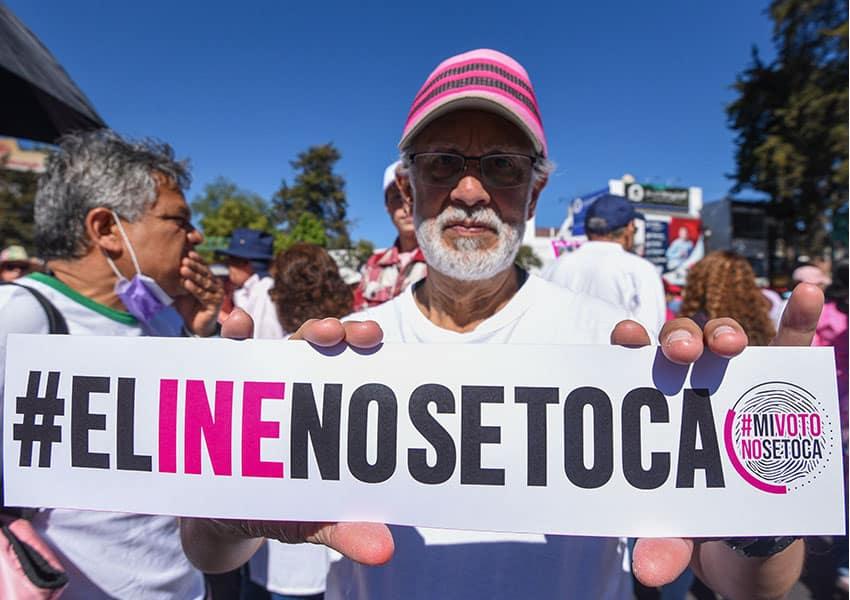
“We need to conserve the last remaining bastion of this country. If the court falls, Mexico falls,” said Mendoza, who claimed that the president’s attacks on the SCJN are designed to distract people from Mexico’s real problems.
Business owner Cristina Velázquez told AP that the Supreme Court justices enforce laws and “don’t bend to the will” of López Obrador, and “he doesn’t like that.”
According to an AP report, a clash between pro-SCJN demonstrators and anti-court activists took place after the latter, who were camping out in front of the Supreme Court, began throwing objects at the former and insulting them.
There were scuffles between members of the two sides, and the pro-SCJN demonstrators expelled the anti-court activists from the site of their plantón, or sit-in protest. They proceeded to take down their signs, with messages disparaging justices, which had been stuck to the doors of the court building.
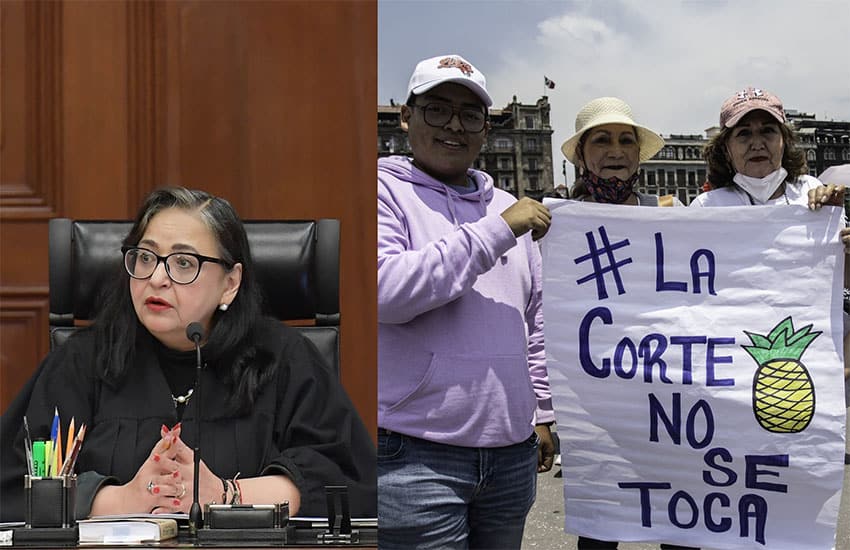
Other anti-SCJN protesters burned an effigy of Chief Justice Norma Piña — of whom López Obrador has been especially critical — at an event in the Zócalo in March at which the president spoke, and some have carried mock coffins featuring her image at marches against the court.
While demonstrators on Sunday succeeded in showing their support for the Supreme Court, a street vendor, Belén Esquivel, asserted in an interview with AP that the march in Mexico City “mobilized almost no one” compared to pro-AMLO rallies.
The president himself participated in a march last November to celebrate four years in office. That parade, which Mexico City Mayor Claudia Sheinbaum reported attracted around 1.2 million people, was dubbed a contramarcha, or countermarch, because it took place two weeks after hundreds of thousands of people took to the streets to protest a proposed (but ultimately unsuccessful) electoral reform bill.
López Obrador on Monday criticized the demonstrators in Mexico City for “provoking” anti-court activists and removing the signs they had posted to the country’s top tribunal.
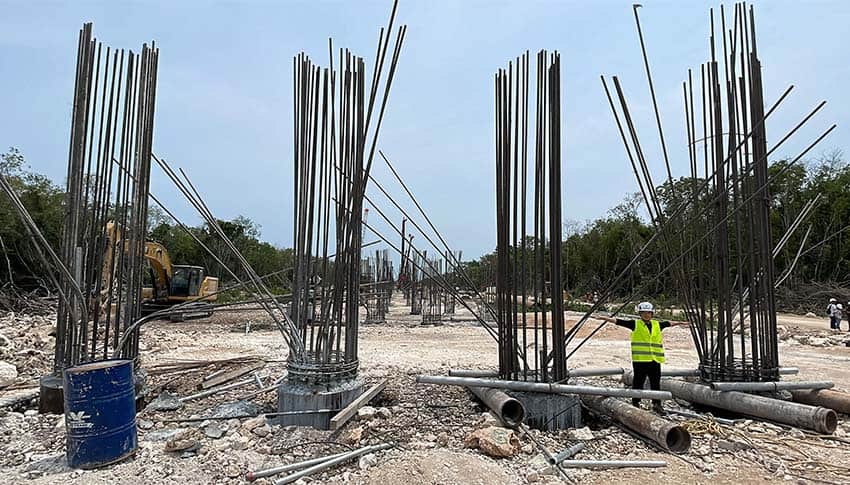
“We have to see who they are, not to go after them, not to suppress them … [but] no one should be evicted [from their place of protest]. Everyone has the right to demonstrate,” he said.
With reports from El Financiero, AP, El País, El Universal, Milenio and Expansión
